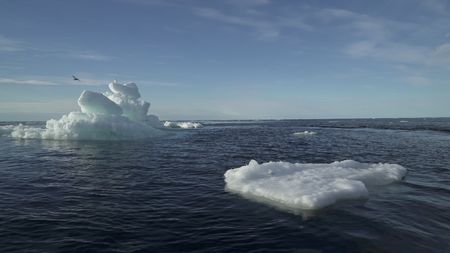
Union Minister Dr. Jitendra Singh releases India’s Arctic Policy in New Delhi

India’s Arctic policy would play an essential role in preparing the country for a future where humankind’s biggest challenges, like climate change, can be addressed through collective will and effort, says, Dr. Jitendra Singh
Implementing India’s Arctic policy will involve multiple stakeholders, including academia, the research community, business, and industry. India’s engagement with the Arctic region has been consistent and multidimensional and it maintains that all human activity should be sustainable, responsible, transparent, and based on respect for international laws
Union Minister of State (Independent Charge) Science & Technology; Minister of State (Independent Charge) Earth Sciences; MoS PMO, Personnel, Public Grievances, Pensions, Atomic Energy and Space, Dr Jitendra Singh, released India’s Arctic policy titled ‘India and the Arctic: building a partnership for sustainable development’ today from the Ministry of Earth Sciences Headquarters in New Delhi.
Emphasizing the importance of India’s Arctic policy, Dr Jitendra Singh said that under the leadership of Prime Minister Shri Narendra Modi, India has proudly moved forward to join an elite group of countries working on various aspects of Arctic.
Lauding the efforts of Indian scientists in studies of Arctic, Dr. Singh said that India’s Arctic policy would play an essential role in preparing the country for a future where humankind’s biggest challenges, such as climate change, can be addressed through collective will and effort. India’s Arctic policy shall be implemented through an action plan, and an effective governance and review mechanism involving the inter‐ministerial Empowered Arctic Policy Group. Implementing India’s Arctic policy will involve multiple stakeholders, including academia, the research community, business, and industry.
The Minister noted that India’s engagement with the Arctic dates back to a century when ‘Svalbard Treaty’ was signed in February 1920 in Paris and, today India is undertaking several scientific studies and research in the Arctic region. He said that Indian researchers are monitoring arctic glaciers for their mass balance and comparing them with glaciers in the Himalayan region. India has also been actively involved in studies related to the Arctic oceanography, atmosphere, pollution and microbiology. Over twenty-five Institutes and Universities are currently involved in Arctic research in India. About a hundred peer-reviewed papers have been published on Arctic issues since 2007. Thirteen (13) nations are observers in the Arctic Council which include France, Germany, Italian Republic, Japan, The Netherlands, People’s Republic of China, Poland, India, Republic of Korea, Spain, Switzerland, United Kingdom. In 2014 and 2016, India’s first multi-sensor moored observatory in Kongsfjorden and the northernmost atmospheric laboratory in Gruvebadet, Ny Alesund, were launched in the Arctic region. Until 2022, India has successfully conducted thirteen expeditions to the Arctic.
India’s Arctic policy titled ‘India and the Arctic: building a partnership for sustainable development’ lays down six pillars: strengthening India’s scientific research and cooperation, climate and environmental protection, economic and human development, transportation and connectivity, governance and international cooperation, and national capacity building in the Arctic region. Implementing India’s Arctic policy will involve multiple stakeholders, including academia, the research community, business, and industry.
India has a significant stake in the Arctic. It is one of thirteen nations holding Observer status in the Arctic Council, a high-level intergovernmental forum that addresses issues faced by the Arctic governments and the indigenous people of the Arctic. India’s engagement with the Arctic region has been consistent and multidimensional. The country maintains that all human activity should be sustainable, responsible, transparent, and based on respect for international laws.
India’s Arctic policy aims to promote the following agenda—
1. Strengthening national capabilities and competencies in science and exploration, climate and environmental protection, maritime and economic cooperation with the Arctic region. Institutional and human resource capacities will be strengthened within Government and academic, research and business institutions.
2. Inter-ministerial coordination in pursuit of India’s interests in the Arctic.
3. Enhancing understanding of the impact of climate change in the Arctic on India’s climate, economic, and energy security.
4. Contributing better analysis, prediction, and coordinated policymaking on the implications of ice melting in the Arctic on India’s economic, military and strategic interests related to global shipping routes, energy security, and exploitation of mineral wealth.
5. Studying linkages between polar regions and the Himalayas.
6. Deepen cooperation between India and countries of the Arctic region under various Arctic forums, drawing expertise from scientific and traditional knowledge.
7. Increase India’s participation in the Arctic Council and improve understanding of the complex governance structures in the Arctic, relevant international laws, and geopolitics of the region.
Implementing India’s Arctic policy will involve multiple stakeholders, including academia, the research community, business, and industry. It shall define timelines, prioritise activities and allocate requisite resources. The National Centre for Polar and Ocean Research (NCPOR) in Goa, an autonomous institute under the Ministry of Earth Sciences, is the nodal institution for India’s Polar research programme, which includes Arctic studies.
India’s Arctic policy is available on the website of the Ministry of Earth Sciences, Government of India at (https://www.moes.gov.in).

















POST COMMENTS (0)